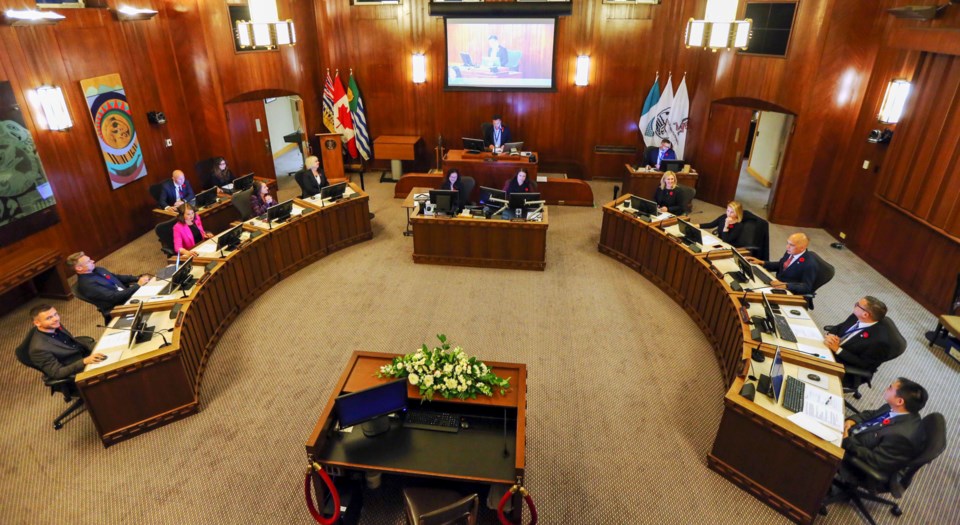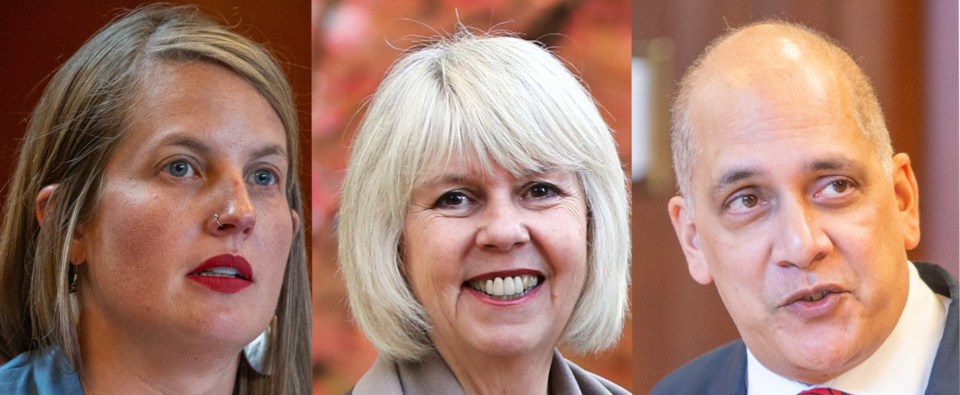It’s now been one year since Mayor Ken Sim and his seven ABC Vancouver colleagues on council have been in power at city hall.
Last week, Glacier Media posted with Sim, who discussed his year in office and announced he is seeking re-election in 2026.
In the interview, he was asked about his relationship with the three non-ABC councillors — OneCity’s Christine Boyle and Adriane Carr and Pete Fry from the Green Party of Vancouver.
This is what he said: “At the end of the day, I like Pete, Adriane and Christine. But we could do a lot more if we rowed together in the same direction. That would be nice.”
That comment was included in a list of seven questions emailed to Boyle, Carr and Fry after the interview with Sim. All three councillors served under the Kennedy Stewart administration between 2018 and 2022, where no one party held a majority.
Their responses to Sim’s comment and others are listed in full below.
What has life been like at city hall as a member of the unofficial opposition?
Boyle: I continue to work hard to bring forward practical, progressive ideas that would make Vancouver safer, fairer and more affordable for us all. But I have been frustrated to see Mayor Sim and the ABC majority slow down or reject most of these proposals, and I have been frustrated by ABC’s habit of bringing forward major amendments to motions and staff reports at the very last minute, limiting the opportunity for the public or non-ABC councillors to engage. There has been a lot of talk of “collaboration” but unfortunately that’s not what I’m actually experiencing when decisions are being made.
Carr: The mayor and ABC councillors are genuinely friendly but tend to run things, as Vision Vancouver did, like a clique, tabling most of their major amendments without notice. It’s gut-wrenching to see the shift in fundamental priorities, like when ABC amended our housing strategy to prioritize all housing [including market condos] instead of focusing on desperately needed affordable rental, de-funded the city’s renters’ office, voted against implementing our Climate Justice Charter, and voted against funding just one penny per resident for my “sue Big Oil” motion with its potential to reimburse hundreds of millions of taxpayer dollars we’ve had to spend coping with extreme climate. I’m sustained by the camaraderie of councillors Fry and Boyle.
Fry: It’s different from the last term in that it feels more oppositional and segregated. There’s also a heavier burden of responsibility and being accountable to the growing number of Vancouverites who don’t see themselves represented by the majority at council.
I know you haven’t been able to advance all motions/amendments that align with your politics. Provide an example of one being shot down, and one where you were successful in getting all of council on side.
Boyle: I was incredibly disappointed that Mayor Sim and ABC voted down my motion to renew leases on existing temporary modular housing [TMH] units across the city. Homelessness continues to increase across Vancouver. We are losing SRO homes to fires, and without a plan from this council to add more new supportive housing units that go beyond just what is being lost, ending the leases on these existing TMH homes will only make homelessness worse.
It was nice of council to stand and applaud me after approving my motion on making it faster and easier to build non-market, co-op and social housing. But before voting for it, ABC moved an amendment to slow it down. And the reality is that they have not prioritized affordable housing, and we haven’t seen any tangible movement on the issue.
Carr: ABC shot down my amendment to add affordability to the housing objectives in council’s strategic priorities for our four-year term. I couldn’t believe it!
Success: After working with councillor [Mike] Klassen who suggested some edits to my motion, council unanimously supported my motion to get Vancouver to increase production of renewable energy — a key to increasing our resilience and tackling the climate emergency.
Fry: I have held back on my own motions, since so far, support for motions/amendments brought forward by non-ABC councillors has been rare and/or contingent on significant amendments.
As far as getting all of council on side, early in the term, ABC attempted to pre-screen grant recipients to ensure that they were “non-partisan” and not saying unfavourable things about the mayor and party. I successfully argued that such a move would be a violation of the Canadian Charter Rights under Section 2, and to my surprise got unanimous support to strike their own amendment.

I interviewed Mayor Ken Sim last week about his first year in office. I asked him about his relationship with the three of you. This is what he said: “At the end of the day, I like Pete, Adriane and Christine. But we could do a lot more if we rowed together in the same direction. That would be nice.” Your response, please.
Boyle: I appreciate Mayor Sim saying that. I will also say that he comes across as a nice, friendly guy. And there is a lot that he and ABC could be doing to include me and councillors Fry and Carr in decisions, if they sincerely want to work together.
But time after time they show up to council meetings seeming to have already hashed out and decided on how they will vote on issues, with significant last minute amendments that the non-ABC councillors get no notice of. And they continue to slow down or vote against pragmatic proposals I bring forward.
Carr: I would love to row in the same direction, but to do that we have to agree on the destination. My destination is a Vancouver that our children and grandchildren will thank us for: a Vancouver that has reduced GHGs in line with what climate scientists are imploring every jurisdiction to do; a Vancouver that has eliminated homelessness and has enough truly affordable housing to meet the needs of all the people who live and work here; a Vancouver that is clean, green and just. Is that ABC’s destination?
Fry: At the end of the day I like Ken too, and of course we would accomplish more together if we were all rowing in the same direction. But we aren’t in a boat, and I wasn’t elected to go along to get along. I’m elected to stay true to my values and ethics – and that may or may not take me in a different direction than the mayor and his party.
Is it easier or more difficult to get things done with the current council, or the previous council? Please explain.
Boyle: The and our meetings were incredibly long and often inefficient. However, under the last council, members of council frequently arrived at meetings without having decided how they would vote, listened to speakers and to one another, and then we deliberated and made decisions in public.
That seems to be much less frequently the case under this current council, and while I’m happy to have shorter meetings, it also feels like some transparency and accountability is being lost as a result. Also, it seems to me that the last council actually accomplished more than this ABC majority has so far.
Carr: Well, it’s obviously easier for ABC with its super majority to get things done on this council, but not so easy if you’re a Green or OneCity councillor. Last term I was part of a “progressive majority,” comprising councillors from three different parties (Green, OneCity, COPE) plus the independent mayor.
We came to consensus on budgets and all the major staff reports. So things got done. But we also passed 313 independent councillor motions and those were impossible for staff to prioritize and implement.
Fry: It is more difficult. With the previous council since there was no majority party, we had to work together and that generated a lot of cooperation and collaboration across political lines, even when it took an excruciating amount of time.
Today, it seems an extraordinary amount of decisions are being made by ABC caucus and behind closed doors. The outcomes are quicker and more decisive, but much less transparent and democratic. I’ve flagged this concern a few times and the integrity commissioner recently issued a bulletin advising our obligations in decision making and open public meetings.
Is there an issue that is not getting enough attention at council?
Boyle: There are a lot of issues that are not getting enough attention from Mayor Sim and ABC, including affordability, homelessness, the drug poisoning crisis, active transportation and climate action.
Instead, ABC has killed the renters’ office, given empty homes tax funds back to some of the wealthiest developers, eliminated the living wage, loosened requirements for social housing at Little Mountain, and have bragged about ripping out one bike lane and voting down another.
Carr: The climate crisis. Scientists are imploring elected officials at all levels to recognize this year’s catastrophic heat waves, fires, droughts and floods as a huge wake-up call to immediately invest in ramped up action to reduce GHGs and do our part to tackle the climate emergency.
I don’t think ABC recognizes the imperative to invest much more in climate mitigation for the sake of our children and the city and world they are inheriting.
Fry: I would say rental housing and protections — but only because you asked for a singular issue, it would be a pretty long list actually — in this first year alone we have seen a pretty significant rollback on policies with shuttering the renters’ office, rejecting a pace of change for displacement on the Broadway Corridor, abandoning below-market rental targets in favour of “net new” housing of all kinds, reimbursing developers for unsold strata inventory from our empty homes tax social housing fund, suggesting the province reduce tenant protections to disincentivize short-term rentals, and removing occupancy permit holds that would have required Holborn to meet their social housing obligations
The mayor told me that he will seek re-election in 2026. Your response.
Boyle: No comment.
Carr: Good on him. He does appear to enjoy the job, evident in his positive interactions with people. I wonder what his policy goals would be for a second term?
Fry: I guess fulfilment of the secret list of five things the mayor needed to accomplish before leaving office is proving elusive?
Do you plan to seek re-election in 2026?
Boyle: I haven’t decided what my 2026 plans are yet.
Carr: Too soon to tell.
Fry: Yes, even if ABC managed to retain their juggernaut of corporate-backed political power going into 2026, it’s important that at the very least there is political opposition to hold them accountable, challenge them on their record, and speak truth to power.

